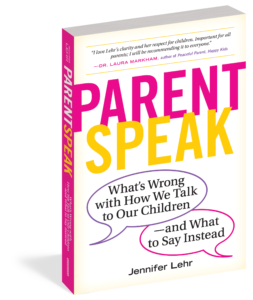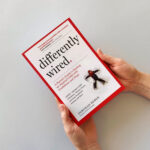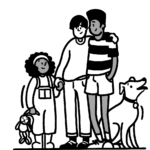In our third weekly ParentSpeak challenge, author Jennifer Lehr asks you to spend a week identifying your own triggers—what do your kids do that makes you angriest? What drives you to raise your voice? Then, it’s time to examine why.
“I said right now!”
“Don’t make me ask you again!”
“I’ve had it!”
We’ve all been there. We don’t want to lose it and then we do. And we start yelling at our kids.
I’m not going to sugarcoat it. Quitting screaming is hard. My friend Jill, who’s been trying to stop in earnest for a while now, has been both surprised and incredibly frustrated by how impossible going cold turkey has been. “It’s given me a sense,” she confided, “of how hard it must be to stop drinking or doing drugs. Your body just goes there.”
Yelling is a habit deeply ingrained in us, likely because we were yelled at as kids ourselves. It can be such a stress reliever, not to mention, it’s often effective.
Unfortunately, the more we yell, the more we end up yelling, because we’ve been training our kids to know they don’t really have to listen until we start screaming. Soon we’re on the path of turning ourselves—our children’s source of support, comfort, and guidance—into people to be feared.
For many kids, it can begin to feel as it did for the children of Michelle Baxter, a self-professed screamer and mother of two, who shared in an article for Today’s Parent that her kids “were walking on eggshells around me and they worried about what might set me off.” Worse still, if we take our yelling too far, clinical psychologist Dr. Laura Markham warns, children “harden their heart to you because their trusted bond to their parent is broken. Once that happens, the child will no longer try to please you. This is the child that will likely grow into a troubled teenager and possibly adult, as well.”
So how do we quit?

The first step, and this is this week’s challenge, is to try to spend the week noticing what your kids do that trigger you most.
Many in the mental health field describe our extreme reactions to our children’s behavior as being “triggered” by experiences from the past. Triggers are unresolved feelings that cause us to overreact. Psychologist Margaret Paul explains, “When we were growing up, we inevitably experienced pain or suffering that we could not acknowledge and/or deal with sufficiently at the time. So as adults, we typically become triggered by experiences that are reminiscent of these old painful feelings.” Or as family counselor and parenting coach Sharon Selby explains in her article “How Does Our Own Upbringing (Our Triggers) Influence Our Parenting?”: “We have unconscious imprints from our childhood experiences—our schooling, our families, and other childhood influences. . . Every time we get triggered and our blood begins to boil and our heart beats faster, our unconscious has just been activated . . . we get flooded by our emotions, we lose our patience and our rational thinking abilities, and act on instinct to protect ourselves.”
That’s when many of us start screaming—it’s the fight part of the freeze, fight, or flight response. In fact, Dr. Dan Siegel, a clinical professor of psychiatry at the UCLA School of Medicine and Executive Director of the Mindsight Institute, explains that when one is triggered, it can literally feel like “you are experiencing the event for the first time, and it can feel intrusive, confusing, and even terrifying.” So we can be going along and then all of a sudden something our kids do or don’t do instantaneously reactivates an old wound and, suddenly, alarms sound.
My challenge is to identify what triggers you most.
Is it mornings when they aren’t getting ready for school?
Is it the kids not “listening” when you’ve asked them to do something more than a couple of times?
Not cleaning up a mess?
Not saying “thank you?”
After you’ve identified a trigger (or two or three), the next step is just think about it. That’s all. To just wonder how it may have gotten there.
How did your parents or grandparents or babysitter or nanny or teacher respond to you around the same issue?
Some insight may come to you.
If we can see how the past is influencing our future, we can begin to let it go. We can reconsider the situation before us and realize we’re bringing a lot of the past to our present. And it’s making things more heated than they need to be.
This alone can make such a difference.
Personally, I think it’s too overwhelming to just say, “I’m going to quit screaming.” It’s a process and it start with looking at what triggers us.
What triggers you?
 About the Book:
About the Book:
A provocative guide to the hidden dangers of “parentspeak”—those seemingly innocent phrases parents use when speaking to their young children.
Imagine if every time you praise your child with “Good job!” you’re actually doing harm? Or that urging a child to say “Can you say thank you?” is exactly the wrong way to go about teaching manners? Jennifer Lehr is a smart, funny, and fearless writer who “takes everything you thought you knew about parenting and turns it on its ear” (Jennifer Jason Leigh).
Backing up her lively writing and arguments with research from psychologists, educators, and organizations like Alfie Kohn, Thomas Gordon, and R.I.E. (Resources for Infant Educarers), Ms. Lehr offers a conscious approach to parenting based on respect and love for the child as an individual.
Buy the Book
Amazon | B&N | Indiebound | Workman





No Comments